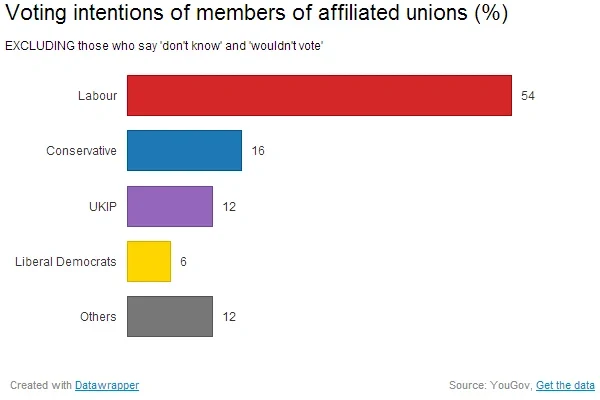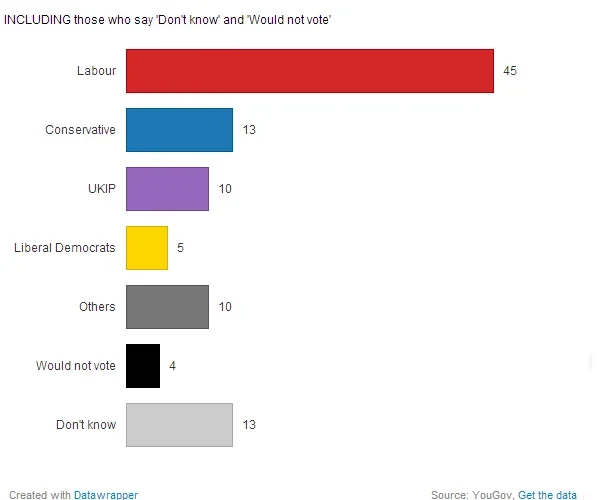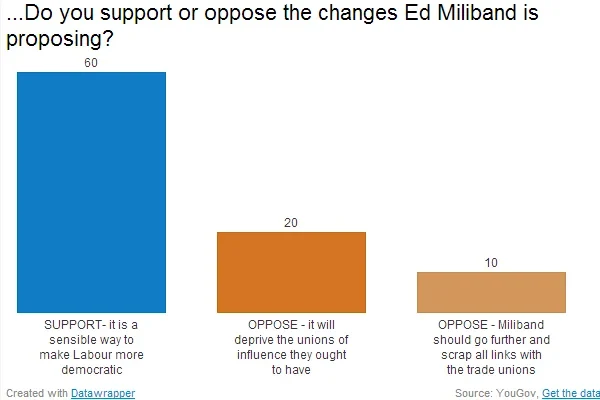Most members of trade unions affiliated to the Labour Party would NOT vote Labour if a general election were held this week, according to a YouGov analysis on the eve of Ed Miliband’s speech to the Trades Union Congress
Want to receive Peter Kellner's commentaries by email?
On behalf of Channel 4 News, we have aggregated data from YouGov polls conducted since June 30. Together, we collected the voting intentions of 2,380 members of affiliated unions. Labour enjoys a massive lead. Excluding those who say ‘don’t know’ and ‘would not vote’, voting intentions are:

At one level, these figures are good news for Labour. It still enjoys a hugely dominant position. However, this is partly because support for other parties is fragmented. Their total, 46%, falls short of Labour’s support, but not all that far short. And if we count ALL respondents, including those who are unsure or say they won’t vote, Labour-supporting members of affiliated unions are in a minority:

In the light of these figures, we should not be surprised by the findings of a new YouGov survey for the unofficial Labour website, Labour Uncut. This finds that 53% of members of affiliated unions think that trade unions should have ‘not much influence’ on the Labour Party or ‘no influence at all’.
While union members divide fairly evenly on the current system by which unions finance the Labour Party, there is strong support for Ed Miliband’s proposed reforms. We asked:
Q. Ed Miliband wants to change how the unions donate funds to Labour. In the future the party will only accept affiliation fees from individual union members who positively decide to donate a part of their union membership fee to the Labour Party. They will then become individual members of the party. This will replace the current system where unions decide centrally how many of their levy-paying members to affiliate to the Labour Party. Do you support or oppose the changes Ed Miliband is proposing?
Fully 60% of members of affiliated unions support this as ‘a sensible way to make Labour more democratic’, while another 10% think Miliband ‘should go further and scrap all links with the trade unions’. Just 20% reject Miliband’s proposal on the grounds that ‘it will deprive the unions of influence they ought to continue to have’.

As for the two formal ways in which the trade unions influence Labour nationally:
- 61% of members of affiliated unions want the voting power of the unions at Labour’s national conference to be either reduced (39%) or abolished completely (22%)
- Just 22% of members of affiliated unions want union members to continue to have one-third of the vote in the electoral college that elects Labour’s leader. The most popular option is for an electoral college that divides 50-50 between Labour MPs and individual party members (including ‘trade union’ members who join the party under Miliband’s reforms). 15% want party members alone to choose party leaders, while 10% would give the power back to MPs, who used to elected party leaders until the system was changed in 1981.
These findings suggest that Ed Miliband’s reforms command the support of most members of affiliated unions – but that, given the level of support for Labour among these union members, one major reason why only a minority of union members support the present arrangements is because only a minority of them support Labour.
Want to receive Peter Kellner's commentaries by email?Image: Getty





